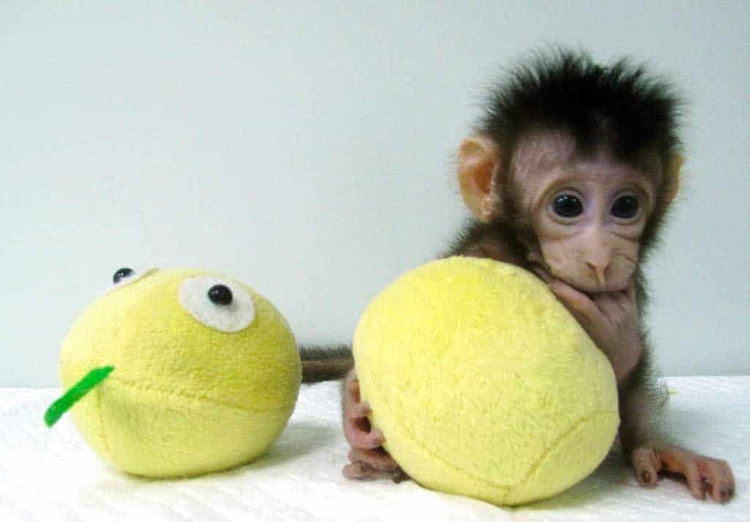Chinese successfully cloned monkeys, approaching the human clone
This is the first time in a history of a genetically close primate with a successful replication.
The long-tailed monkey named Trung Trung and Hoa Hoa was born 8 and 6 weeks ago in a laboratory in China. What is special is that these two monkeys are the first pair of primates born through DNA transfer, similar to the 1997 case.

Monkey Hoa Hoa was born 6 weeks ago.
The success of Chinese scientists marks a big advance in the field of cloning, but also raised many doubts about morality. Many experts believe that this technique can be used to duplicate people.
Scientists assert, the success of research will help them find ways to cure human diseases today. In 1999, a monkey named Tetra was born asexually but by a simpler method than embryos. The technique applied to the two Trung Trung and Hoa Hoa monkeys is the core cell transfer technology (SCNT).
After Dolly sheep was born in Scotland more than 20 years ago, many other mammals were born by SCNT. This method takes a central piece of DNA into the egg and nourishes it into an embryo. Species that have been cloned include sheep, pigs, dogs, cats, and mice.
The author of this work is Dr. Qiang Sun, director of the Primate Research Center in Shanghai. Mr. Sun hopes that serious diseases such as cancer will be cured in the near future by studying cloned primates.
- The world's first humanized double monkey fate in China
- The human embryo has been cloned
- Korea continues to successfully clone dogs
- Successfully cloned 8 North American wolves
- China announced the successful cloning of the first cat
- Reveal the fate of 4 Dolly sheep cloned
- Monkeys know to say 'like' people
- India: Cloned goats for rare wool
- China built the world's largest animal duplication plant
- China cloned dogs for genetic modification to study heart disease
- Cat cloning company closed
- Korea successfully cloned asexual dog
 Green tea cleans teeth better than mouthwash?
Green tea cleans teeth better than mouthwash? Death kiss: This is why you should not let anyone kiss your baby's lips
Death kiss: This is why you should not let anyone kiss your baby's lips What is salmonellosis?
What is salmonellosis? Caution should be exercised when using aloe vera through eating and drinking
Caution should be exercised when using aloe vera through eating and drinking Why did Hoa Than design 9,999 bats in the villa?
Why did Hoa Than design 9,999 bats in the villa?  Who in the world can compete with 'terrible players' Hoa Than: A house pillar costs nearly 9,500 billion VND!
Who in the world can compete with 'terrible players' Hoa Than: A house pillar costs nearly 9,500 billion VND!  The king's murder made the center of the Forbidden City clear of trees
The king's murder made the center of the Forbidden City clear of trees  'Conquering' the Da River to build Hoa Binh Hydroelectricity
'Conquering' the Da River to build Hoa Binh Hydroelectricity  Nakri storm caused heavy rain, many places lost power
Nakri storm caused heavy rain, many places lost power  Discover rhinoceros fossils Rhinoceros siensis near Ruc people
Discover rhinoceros fossils Rhinoceros siensis near Ruc people 